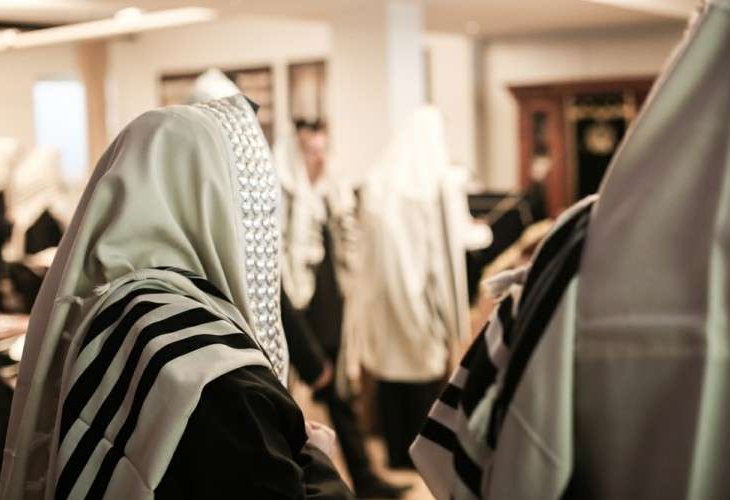Personal Stories
If You Came to Talk—Where Will You Go to Pray?
A personal journey from casual synagogue chatter to heartfelt, focused prayer—and the powerful lessons learned along the way.
 (Photo: shutterstock)
(Photo: shutterstock)Tell me honestly—what do you usually talk about in shul (synagogue)?
Yes, you heard right. I’m not asking if you go to shul. I assume you do. I’m asking: once you’re there, hand on heart—what do you actually do?
I’ll tell you what I used to do. For years, shul was where I davened (prayed), yes—but also where I caught up with friends, shared a laugh, asked about their kids, and, okay, talked about where we were headed for lunch. I wasn’t skipping prayers—I was showing up every day, saying the words, connecting with Hashem (God)... and also chatting a fair bit in between.
And then one day, I saw a sign that caught me off guard. It said:
“If you came to the synagogue to talk—where will you go to pray?”
That sentence hit me hard. I froze. I wasn’t quite sure what to answer.
On the one hand, I hadn’t come to socialize, not really. I believed in prayer. But how could I not say hello to a friend? What’s so terrible about asking someone how they’re doing?
But that sign kept echoing in my mind. It made a good point. So I went home, opened a few sefarim (Jewish books), and started to learn. Something inside me needed to understand: Why does talking during davening matter so much? Isn’t prayer itself just talking?
I learned that a shul isn’t just a room with chairs and prayer books. It’s a mikdash me’at—a “miniature sanctuary.” A holy place, like a small version of the Beit HaMikdash (Holy Temple) that once stood in Jerusalem. That means we treat it with kavod (respect), keeping our focus on Torah, tefillah (prayer), and kedushah (holiness).
And then I read something that really shook me: someone who speaks in shul during davening—not just idle chatter, but even “harmless” small talk—can actually block their own prayers. Worse, they can hold back the prayers of the entire tzibur (community). Instead of building spiritual walls of protection with our tefillot, we risk tearing them down with unnecessary words.
That realization changed everything for me.
But it wasn’t easy.
I made a commitment: no talking during prayer. I wanted to focus on what I came to do—to pour out my heart before the Ribbono Shel Olam (Master of the World).
At first, I slipped. One morning during the chazzan’s (cantor’s) repetition, a friend whose son had just gotten married stood beside me. It felt wrong not to say “mazal tov,” so I did. And then, of course, we kept talking. By the end, I couldn’t remember where I was in the siddur (prayer book). I felt awful.
But I didn’t give up.
One day, I came to shul with a small note in my pocket. Just in case I needed help sticking to my decision. And wouldn’t you know it—right in the middle of davening, Moshe sat down next to me. He had taken a driving test the day before, and I was dying to ask how it went. But I stayed strong.
When they took out the Torah, Moshe caught my eye. He tried to chat. I almost gave in. But instead, I pulled out my little note and held it up:
“Please forgive me. I no longer talk during prayer. This is in the merit of a refuah (healing) for Yosef Chai ben Miriam.”
Moshe read it, paused—and then smiled. “Amen,” he whispered. “May he have a full recovery.”
That moment stayed with me.
Years later, I still carry that note. Not because I need it—by now, people know I don’t talk during davening—but as a reminder: if you make a decision for Hashem, and you really mean it, He helps you succeed.
That note represents something big. The path from being seen as overly strict or even strange… to earning respect. From casual prayer to something deeper and real. From knowing that Hashem listens—to doing my part to make sure He hears.
And here’s something more personal. Imagine that one of your deepest prayers—for a child, a spouse, health, peace at home—was almost answered. Almost. But it got stuck on the way up because you were busy whispering something you could’ve waited ten more minutes to say.
Who would want to risk that?
Our words have incredible power. They can open the gates of heaven—or block them. They can bless or, chas v’shalom (Heaven forbid), do the opposite.
But here’s the good news: guarding your tongue, especially in a holy place, brings powerful blessings. Long life. Sustenance. Peace of mind. And when the time comes, even rest for the soul.
The sages taught, “Who is strong? One who conquers their yetzer hara (inner urge).” It’s hard—but it’s worth it.
So next time you walk into shul, ask yourself quietly: Did I come here to talk—or to pray?

